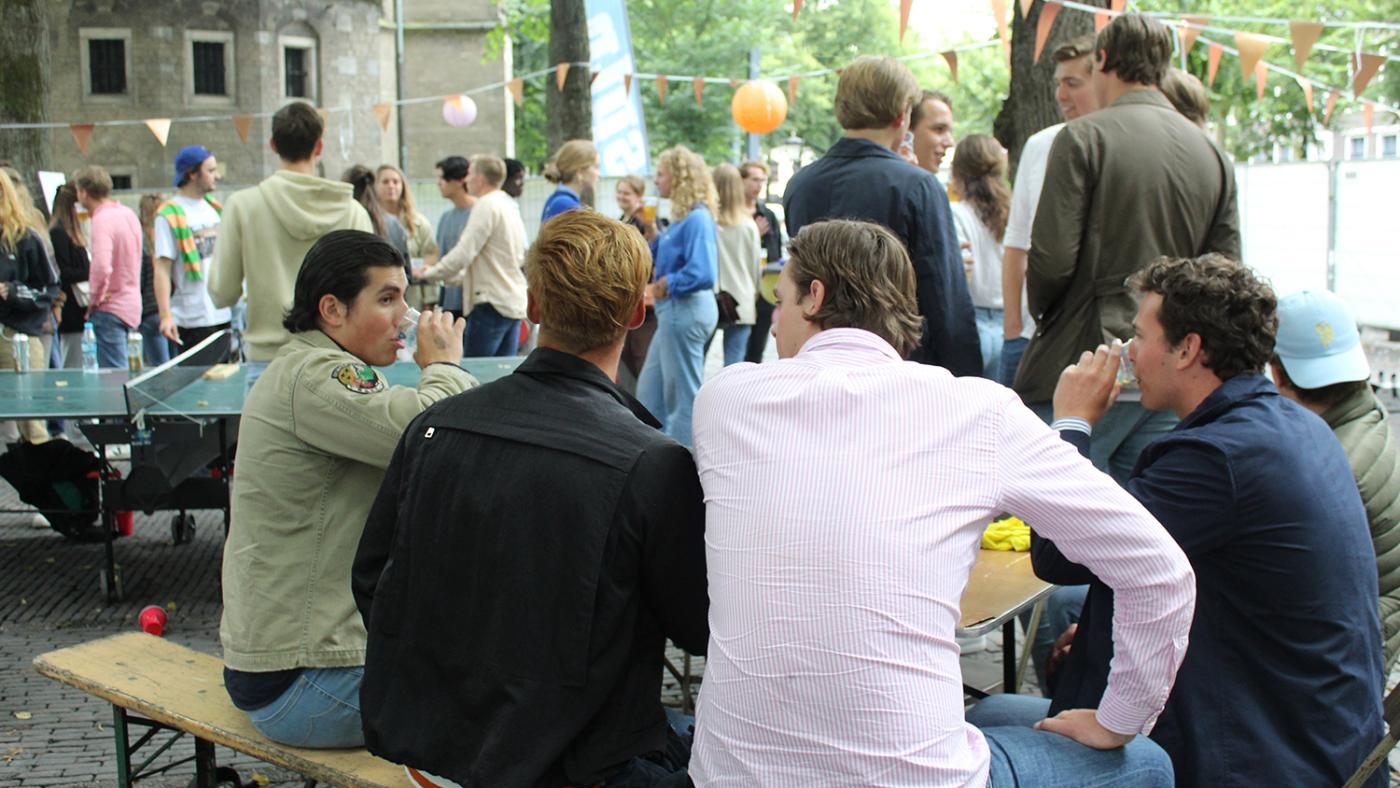Research on talking about mental health
Where do male students go to talk about their issues?

Harder Better Faster Stronger is the title of a song by Daft Punk, but it is also the title of a report by Trimbos Institute published last June. The document laid bare a paradox: although it’s important to be able to discuss students’ mental health, excessive media attention to the topic can lead to “students problematising their issues”.
Lack of awareness is not a problem, but structural change is more complicated to achieve. It remains unclear how effective all the initiatives to improve students' mental really are. Earlier this year, the outgoing minister of Education, Robbert Dijkgraaf, announced plans to reduce the number of credits required to move on from the first year of a Bachelor's programme to the second year. The goal, once again, is to improve students' mental health. However, the two parties with the most seats in Parliament, VVD and D66, questioned whether the measure was empirically substantiated. At the time, DUB asked its panel of students and employees to give their two cents on the matter, and they unanimously voted against it.
In 2018, concerns about students' mental health were already prevalent, so much so that UU set up a taskforce to work on student wellbeing. Since then, many of the goals set at the time of its founding – such as more awareness and the availability of appropriate help – have been realised. Today, the university offers a wide range of courses, activities, study groups for students with disabilities, among other things. It also organises a biannual Wellbeing Week.
Groups of young men
Even so, the crisis has not been averted, according to Thomas Bijl, who has recently spoken with DUB as a board member of the organisation Frisse Gedachtes (‘Fresh Thoughts’, Ed.), which aims to promote student wellbeing by stimulating social contact, organising events and workshops, and offering a chat platform. “We often say that mental health is becoming easier to discuss but students still struggle, there is abundant evidence of that. To what extent do students actually talk about how they’re doing? And what has to happen to make sure that they do?”
A specific group may offer a partial answer to that question: men who socialise almost exclusively with other men. Thomas researched that group for his Master's thesis in Organisations, Change and Management. He graduated in June. He specifically looked at what Trimbos Institute calls the "perceptive component" of mental health. That's the meaning that individuals, groups and society as a whole attach to mental health. The ability to discuss the topic is a part of that meaning.
We don’t know much about how much groups of young men are willing to discuss mental health, explains Thomas. “What we do know is that there is a certain macho culture among groups of men. That’s something we often see in the news when they cover student associations, especially when they talk about men's behaviour in student associations. But what it is that makes men unable to discuss mental health, and why they feel as though they can’t talk about it with other men, that’s something we don’t know much about. People say that, due to macho culture, men who talk about their mental health are considered weak and have a lower chance of getting a job as they are truly considered inferior to others. However, that's never actually been studied.”

Thomas Bijl. Photo: Tara van den Broek
Conversations
For his research, Thomas spoke with sixteen members of an exclusively male student association. They are from different years and some of them are already graduates. The association in question did not commission the request but their path crossed Thomas' thanks to the Mind Us foundation, which asked him to study groups of young men. “I used the association as an external case study because it’s the only association in the Netherlands that is officially acknowledged as exclusively male, which is interesting in and of itself. This fraternity has been focusing a lot on mental health lately as there have been a number of suicides among their members these past few years. Taken together, these elements made me conclude that theirs was a case study I could work on.” Thomas and MindUs agreed not to reveal the name of the association, which is why DUB is not mentioning them by name either.
This fraternity differs from other groups of men, like sports teams, in aspects such as hierarchy but, according to Thomas, it can work as an example even in that regard. “Outsiders might think that it makes sense for a fraternity to have a hierarchy. Hierarchy is present in all groups but I noticed in my research that, in this association, it was mentioned explicitly. Members often talked in terms of being lower or higher up.”
Such a clear hierarchy makes it easier to establish mental health as a conversation topic top-down. “Hierarchy often has negative connotations but it clearly has positive sides as well, when it comes to making mental health a conversation topic. My advice here is to use people who lead by example. If they display exemplary behaviour, others will follow. That way, you create a culture in which it’s normal to discuss mental health issues.” Outside students, role models can show male students that they are free to discuss their wellbeing. “That is different for each student, of course. A lecturer could be a role model too.”

Photo: DUB
Broad foundation
The fraternity Thomas studied also differs from other groups because it has a closed, inward-looking culture. Members are required to be present at the association's headquarters a few nights a week and around half of its members live alongside other members in houses owned by the association. It's important for those members – and for men in general – to develop themselves outside the group as well. “Young men should feel free enough to do things outside of the groups they are part of.”
According to Thomas, a foundation like Mind Us can use the results of the study to manage expectations first-year students may have of their lives at university. “You can tell secondary school pupils that it’s okay not to do any extracurricular activities, just obtain your credits in the first year, not move out of your parents' house right away, and take your time to see what life as a student has to offer.” Information like this can make students more resilient.
However, Thomas underscores the importance of not overestimating the effects of information. “When it comes to cultural changes, the advice is to start small. Don’t say that everything has to be up for discussion overnight, say that everything has to be different from one moment to the next. We should be aware of that.”
Cultural change
Thomas adds that the association he studied is changing slowly too. “Graduates indicated that it was harder to talk about their mental health back when they were students and that things seem to have truly changed these past few years." The fraternity has organised a number of events about mental health, to which the association's houses also contribute. “Resident assistants, the so-called huisoudsten, get together sometimes to talk about mental health. They teach each other how to deal with it and how you can get your roommates involved. They also organise 'personal’ chat rounds. That’s when all roommates get together to talk about how everyone’s doing. These are all initiatives that improve mental health and, because of them, I couldn't help but notice that first and second-year students say that mental health definitely is a conversation topic.”
Here, too, there is much more that still needs to change, though. "A side note is: to what extent is it something they talk about? If I ask you: 'How are your studies going?’ and you say ‘Not that great’, and I respond with ‘Oh, that sucks’ and that’s where the conversation ends, to what extent is that really talking about mental health? So, there is still a question concerning how deep it goes. That’s hard to find out, though. I’d really have to sit at their dining table or join them at the pub.”
In the end, change is a matter of constant effort. And the responsibility for that effort, according to Thomas, lies with all of society —from primary schools to governments, from students to parents. Student associations share part of that responsibility, too. “Things are definitely changing in our culture, I notice that when I talk to members of that fraternity. But cultural change takes a few years. There’s a lot that still has to happen.”
You can talk about suicidal thoughts through the national suicide prevention line, 113. Call 0800-0113 or visit www.113.nl.